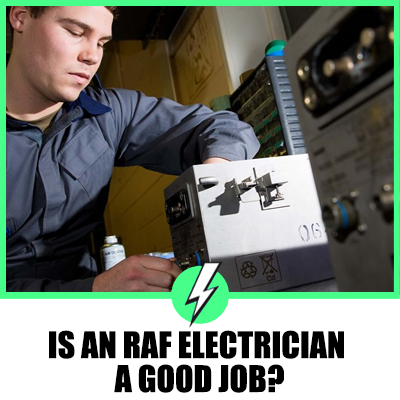Is An Raf Electrician A Good Job?
Are you considering joining the UK forces to train for a career as an electrician? What are the prospects of securing an electrician’s job when I finish my service?
As an aviation electrician, the RAF is the perfect career path for you. The training is top-notch, and you will work on electrical systems that you can easily apply in civil life. Plus, aviation electricians are in high demand worldwide, making employment opportunities excellent.

Contents
What qualifications do I need to join the RAF as an electrician?
You will need at least 5 GCSEs with a minimum grade of C. The GCSEs will include maths, physics and English.
The joining age has a wide range and is from 16 years old to 48 years at your next birthday, allowing a wide section of society.
You will need to pass a physical assessment before joining the RAF.
Do you only work on aircraft as an RAF electrician?
No, during your training modules, you will be tasked to work on general electric systems. Keep in mind most RAF personnel are on ground bases and live in accommodation provided by the RAF.
AS an RAF electrician, you will cover everything from being a domestic installer to high voltage systems.
One day you may be repairing air conditioning units in the heat of the desert or fault finding on wiring harnesses on the most advanced fighter jets in the world.
The diversity of being an RAF electrician is what makes the RAF electrician an attractive proposition when returning to civilian life.
How long will I train?
After your initial induction, you will be sent to RAF St Athan near Cardiff, Wales, for specialist training. This training lasts for approximately 16 months.
You will be enrolled on an advanced apprenticeship, and civilian instructors will take you from no knowledge to understanding electrical engineering principles.
After completing your theoretical training, you will put everything you have learned into practice and gain hands-on experience across a wide range of equipment.
How does the RAF electrician compare to a civilian trained electrician?
The RAF training is more intense than training as a civilian, and their RAF electrician knocks almost 1 year off a civilian training scheme or apprenticeship.
The training is very similar, and the qualifications are almost identical such as NVQ level3 Diploma and 18th edition wiring.
What qualifications will I receive in the RAF as an electrician?
At a minimum, you will be awarded a City & Guilds Level 3 Progression Award in Electrical Engineering and the 18th edition wiring regulations qualification. You will receive your first posting.
Your specialist training and the experience you gain on the job will lead to the award of an NVQ Level 3 in Engineering Maintenance (Electrical), and your Advanced Apprenticeship could be completed within 3 years of joining the RAF.
You can then proceed to specialist training.
How far can you go with training?
The RAF is keen to make you the best electrician in the service and will keep training you if you wish. After completing your NVQ Level 3 Diploma in Electrical maintenance, you can progress to a BEng course in general engineering and engineering management.
The BEng course is typically 3 years and is module-based, so there are no terrifying written exams to pass.
The training courses you will undertake in the RAF are aligned with civilian courses making your transition back to civilian life seamless in gaining employment.
Will You go on tour?
Yes, but it may not be what you imagine. Your first tour is likely to be assigned to an airfield in the UK or overseas as a general electrician depending on world politics.
You may be servicing power generation units to change the lighting in your residence. Or, you could be working on complex fault finding on an aircraft.
Being an RAF electrician is challenging and rewarding but never boring with the diverse workload.
What does an RAF electrician get paid?
A competitive salary. While training, you will receive around 20 k per annum plus other benefits.
Keep in mind that when living on an RAF base, your food is supplied, and your accommodation is supplied, so the potential for saving a large portion of your salary is possible.
You will receive 38 days of holiday a year, and you can pull forward up to 10 days of holiday from the upcoming holiday year.
The holidays are far better than working as an electrician and civilian, and the pay is comparable.
The RAF has a pension scheme, and depending on the service agreement you have signed will start paying into your pension plan.
Is a career in the RAF good?
The RAF offers excellent job security, and as an electrician, you will be challenged with your work depending on your speciality.
Typically you work regular days, and if you wish, you can head to the bar with your mates after work or head down to the gym.
You may have family living with you, so your home life can be daily as it would be if you dan a civilian job.
Can you have a normal life in the RAF?
If you are not deployed overseas, your daily routine will be 9 to 5, with a weekend off to do whatever you wish.
If you are deployed, you will be expected to get the job done regardless of the hours worked.
Generally, life in the RAF is every day, and the transition to joining is easy.
Is it hard to get into the RAF?
It’s not easy, and a certain number of recruits fail the rigorous basic training and will push you to the limits of your physicality and mental prowess.
If you fail, you can retry and retake the course.





